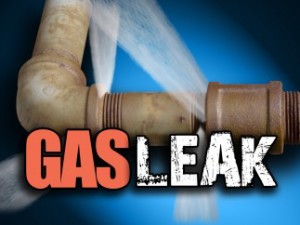As the nation’s pipelines increase in age, natural gas leaks are becoming more and more common.
 Natural Gas Leak. 2011. Photograph. winknews, New York. Web. 19 May 2013.
Natural Gas Leak. 2011. Photograph. winknews, New York. Web. 19 May 2013.
Having the knowledge necessary to be able to prevent and detect a gas leak early on is extremely important in order to prevent potential natural gas emergencies. Understanding what a natural gas leak emergency is and how to react is vital to ensure you and your family’s safety. Not only am I going to help you to understand what a natural gas leak emergency is and what to do if one occurs, but I’m also going to give you a wide-variety of detection and prevention tips. Having this essential knowledge will help to minimize you and your family’s risks for natural gas leaks emergencies.
There are a few different ways that a potential natural gas leak emergency can be recognized in your home. The most common method of identifying a leak is the pungent “rotten egg” odor that the fumes give off. Natural gas leaks also typically make a distinct blowing or hissing sound. Natural gas leakage in an area where vegetation grows can be easily detected because the plant life will die or become discolored.
If you suspect that there is a gas leak in your home it is critical that you react quickly or else the results can be very detrimental. First, leave your home immediately and make sure to not use any electrical devices, such as light switches or telephones. Electricity usage could spark or ignite the natural gas leak. Open flames could also cause this so be sure to not use matches or lighters. Lastly, leave the area and call your utility company to deal with the problem. It is always best to let experienced professionals repair any gas leaks in order to decrease the risk of natural gas explosions. Do not return to the area until your home has been deemed safe by trained professionals.
Unfortunately, by the time that you really notice a natural gas leak from the smell or sound it has already become a potential gas emergency. That is why it is vital that you take preventative measures to prevent leaks before they occur. In order to prevent gas leaks, be sure to follow the manufactures instructions when operating natural gas appliances and always use natural gas appliances for their intended use only. Be certain that gas appliances are installed and maintained properly and safely. It is also important to hire a professional to check and maintain gas appliances annually.
Having a home energy audit done can help to detect hidden natural gas leaks in your home’s gas supply pipes early on before they become a serious problem. Most homes have some leaks but once they are simply detected they can be tagged for easy repair. During the home energy audit the inspectors will perform a Combustion Appliance Safety and Efficiency test. In order to check for natural gas leaks they will use a calibrated gas leak detector at joints, fittings and along pipes to determine if fuel is leaking. Combustion Appliance Safety and Efficiency tests will not only test for natural gas and propane leaks but also for potential carbon monoxide poisoning and fire hazards. By having home energy audits done regularly you will be able to catch natural gas leaks early on, before natural gas emergencies occur. Natural gas leaks are fairly common in homes but by taking necessary precautions and having home energy audits performed regularly it’s easy to protect you and your family from the potential dangers of natural gas.
For more information on how to prevent gas emergencies go to:
http://www.consumersenergy.com/content.aspx?id=1547For information on energy audits go to:
http://www.homeenergyefficiencyaudit.com/ http://jasminestuart99.tumblr.com/Tags
Subscribe to NV Roofing's Blog



